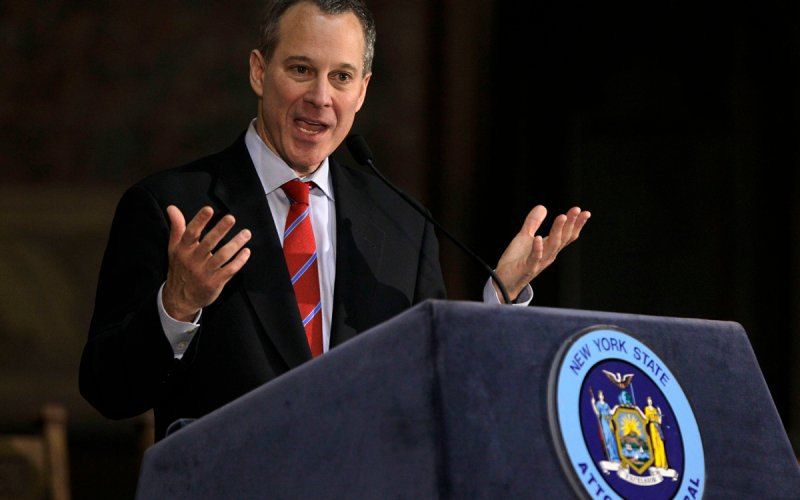DFS Antagonist Eric Schneiderman Attacks Donald Trump’s Charity
Posted on: October 4, 2016, 07:57h.
Last updated on: October 12, 2016, 03:21h.

New York Attorney General Eric Schneiderman isn’t a fan of daily fantasy sports (DFS) or Republican Party presidential candidate Donald Trump. But Schneiderman is a fan of the cease and desist order.
This week, the Democratic state attorney general who has endorsed Hillary Clinton, issued a cease and desist directive against the Donald J. Trump Foundation.
Schneiderman argues the charitable organization failed to register with the state’s Charitable Bureau, and is therefore in violation of state law.
The billionaire’s personal foundation provides scholarships to college students, and grants to veterans programs. According to Charity Navigator, an online database that collects financial reports and tracks the activities of 501(c)(3) philanthropies, the Trump Foundation listed $1,273,895 in assets and $500,849 in income on its most recent Internal Revenue Service (IRS) Form 990 filing.
While The Donald is the largest donor to the foundation, Schneiderman is making sure the group immediately suspends soliciting all potential contributions in New York. And at the same time, he gets to make a name for himself as someone who is against Trump.
“While we remain very concerned about the political motives behind Attorney General Schneiderman’s investigation, the Trump Foundation nevertheless intends to cooperate fully,” Trump spokeswoman Hope Hicks said in a statement.
Many Returns of the Day
Every political outlet has been desperately trying to get its hands on a Donald Trump tax return, and this week The New York Times landed the holy grail of liberal documents.
On October 1, The Times published Trump’s 1995 tax records that show the GOP nominee took a $916 million loss. That is, of course, troubling for the candidate who has built his presidential campaign on his smashing business successes.
In 1988, Trump bought the unfinished Taj Mahal in Atlantic City for $230 million. To complete the project in Trump fashion, the New Yorker spent another $750 million on the property.
He financed the casino resort through junk bonds, and paired with the early 1990s US recession, the interest on the high-yield loans became unmanageable.
Trump established Trump Hotels and Casino Resorts (THCR) in 1995 as a publicly traded company to raise capital. The organization was later renamed Trump Entertainment Resorts, and is today owned by billionaire Carl Icahn.
Trump Camp Responds
The $916 million debt was incurred over multiple years, but Trump posted the loss in 1995 as one lump sum. The extensive deficit allowed Trump to cancel out equivalent taxable income over the next 18 years.
Critics believe that’s why Trump is hesitant to release his returns.
But while the narrative concocted by some media outlets is that Trump skipped out on his tax bill, that simply isn’t true. Trump used the tax code to his advantage, and it’s something almost every multibillion-dollar corporation does.
“The only news here is that the more than 20-year-old alleged tax document was illegally obtained, a further demonstration that The New York Times, like establishment media in general, is an extension of the Clinton Campaign,” the Trump campaign said in a statement.
“Mr. Trump has paid hundreds of millions of dollars in property taxes, sales and excise taxes, real estate taxes, city taxes, state taxes, employee taxes and federal taxes. Mr. Trump is a highly skilled businessman who has a fiduciary responsibility to his business, his family, and his employees to pay no more tax than legally required.”
Related News Articles
Maine Lawmakers Narrowly Reject State Tribal Casino Proposal
Most Popular
LOST VEGAS: ‘Tony The Ant’ Spilotro’s Circus Circus Gift Shop
Las Vegas Overstated F1 Race’s Vegas Impact — Report
Mega Millions Reportedly Mulling Substantial Ticket Price Increase
Las Vegas Strip Stabbing Near The Strat Leaves One Man Dead
Most Commented
-
End of the Line for Las Vegas Monorail
— April 5, 2024 — 90 Comments -
Mega Millions Reportedly Mulling Substantial Ticket Price Increase
— April 16, 2024 — 8 Comments -
Long Island Casino Opponents Love New York Licensing Delays
— March 27, 2024 — 5 Comments -
Sinclair Broadcast Group Selling 7.91 Million Bally’s Shares
— April 12, 2024 — 4 Comments
















No comments yet